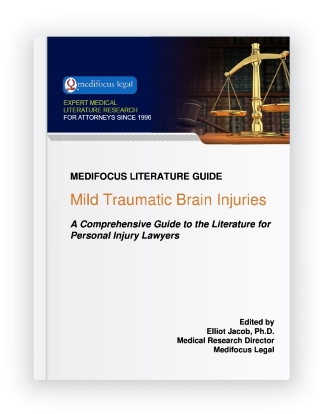Mild Traumatic Brain Injuries A Comprehensive Guide to the Literature for Personal Injury Lawyers
Publisher: Medifocus Legal
Publication Date: May 13, 2020
Number of Pages: 195
A Comprehensive Guide to the Literature for Personal Injury Lawyers
Publisher: Medifocus LegalPublication Date: May 13, 2020
Number of Pages: 195
Although most patients with MTBI typically improve within 5 days, up to 20% continue to have post-concussive symptoms for an extended period of time following the initial injury. The most common causes of emergency room visits for traumatic brain injuries are falls (38%), blunt head trauma (20%), road traffic accidents (16%), and physical assaults (11%). The most common symptom in the days or weeks following the initial injury is headache. Other symptoms may include nausea, fatigue, blurred vision, and sleep disturbances. Cognitive symptoms may also develop in patients who sustain MTBI including attention difficulties, memory problems, and executive dysfunction characterized by a lack of focus or a slowing in the thought process. These symptoms typically improve within 2 to 4 weeks following the injury, however, a subset of patients can experience prolonged symptoms and should be referred for formal neuropsychological testing.
Litigating MTBI cases can be challenging for trial lawyers for several reasons:
- Many of these injuries are commonly overlooked because imaging studies are often normal in the immediate post-injury period.
- Most patients with a MTBI make a seemingly complete recovery.
- Early identification of MTBI patients who are likely to have persistent symptoms or develop neuropsychological deficits is difficult.
- Many of the long-term consequences of MTBI can manifest many months or even years after the trauma and might not be attributed to a prior brain injury from which there was an apparently complete recovery.
The MediFocus Literature Guide to Mild Traumatic Brain Injuries captures the spectrum of clinical and research articles published in peer-reviewed journals about MTBI over the past 2 decades. The articles focus on the diagnostic aspects of MTBI, including the role of different imaging modalities, the potentially serious sequelae of these injuries, the treatment of prolonged symptoms, the prognosis for persistent post-concussive symptoms, and the psychological and social consequences of MTBI.
This newly updated Literature Guide consists of 230 hand-selected articles from MEDLINE with links to the Abstracts of each article plus online access to the FREE FULL-TEXT of 83 articles. The Guide also includes a unique, valuable AUTHOR DIRECTORY for quickly identifying and locating experts with specialized knowledge about MTBI for case evaluations, expert opinion and testimony.
  |
- A comprehensive bibliography of 336 journal article references indexed in MEDLINE published in well respected medical and scientific journals.
- Online access to the abstracts (summaries) of the articles.
- A unique "Author Directory" consisting of the names and institutional affiliations of experts who have published and have specialized knowledge about Mild Traumatic Brain Injuries . The "Author Directory" is a valuable resource for quickly identifying and locating experts for case reviews, opinions, and testimony.
Select examples of topics that are covered by the articles referenced in this Guidebook include:
- Factors associated with persistent post-concussion symptoms following mild traumatic brain injury in adults.
- Mild Traumatic Brain Injury and chronic cognitive impairment: A scoping review.
- Concussion-Mild Traumatic Brain Injury: Recoverable Injury with Potential for Serious Sequelae.
- Predictors for Return to Work in Subjects with Mild Traumatic Brain Injury.
- The prevalence and predictors of poor recovery after mild traumatic brain injury.
- Mild traumatic brain injury increases risk for the development of posttraumatic stress disorder.
- Neurodegenerative changes following mild traumatic brain injury.
- Diagnosis, prognosis, and clinical management of mild traumatic brain injury.
- A systematic review of the risk of dementia and chronic cognitive impairment after mild TBI.
- Persistent vertigo and dizziness after mild traumatic brain injury.
- Neurologically-related sequelae associated with mild traumatic brain injury.
- Medical-legal issues of mild traumatic brain injury.
- Diffusion tensor imaging findings and postconcussion symptom reporting six weeks following mild traumatic brain injury.
- Permanent post concussion symptoms after mild head injury: a systematic review of age and gender factors.
- Systematic review of the risk of Parkinson's disease after mild traumatic brain injury.
- Systematic review of the prognosis after mild traumatic brain injury in adults: cognitive, psychiatric, and mortality outcomes.
- The neuropsychological outcomes of concussion: a systematic review of meta-analyses on the cognitive sequelae of mild traumatic brain injury.
- Diagnostic accuracy studies in mild traumatic brain injury: a systematic review and descriptive analysis of published evidence
- Increased risk of dementia in patients with mild traumatic brain injury: a nationwide cohort study.
- Forensic aspect of late subjective complaints after traumatic brain injury.
is available in two formats: | |
Order by Phone:To order by phone, please call: Order by Mail:To order by mail, please print and complete this Order Form | |

